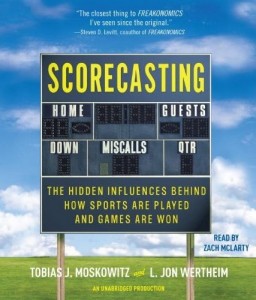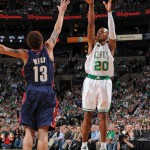The FWG network presents an interview with Toby Moskowitz, half of the brain trust behind Scorecasting, one of the best sports books I have read in a long time.

Corey: First off, I have to applaud you guys for combining sports and economics in a thoroughly entertaining way. If more of my classes in college had been presented in this way I might have attended more than 56% of my classes. Where did the idea for the book come from?
Toby: Jon (Wertheim) and I go way back. We met at summer camp in the 1980s and have been good friends ever since. We’ve both been lifelong sports fans and have always had questions about whether certain sports sayings, like “defense wins championships” are actually true. Several years ago we began talking about writing a book together that combined economic and statistical analysis with sports, similar in spirit to my colleague Steve Levitt’s wildly successful Freakonomics, but applied to sports. We then decided to put some of these sports clichés to the test. We figured if nothing else these were questions and issues we wanted to know the answers to.
C: It seems like there are endless examples that you could have chosen to illustrate the principles discussed in the book. How did you pick which ones to use and which to leave out?
T: It came down to whatever interested us the most and what we thought we could actually analyze in a credible and meaningful way. Things like home field advantage have always intrigued us, so naturally that’s a big part of the book. Also, as life-long Cubs fans we had to write something about the Cubs curse. Other ideas just sprang to us as we thought about sports or, in some cases, were suggested to us by friends and colleagues who have been thinking about similar issues.
C: As a Red Sox fan, trust me, its worth the wait. Were there parts that you guys argued about? How were such disputes settled?
T: There was very little arguing, but certainly some debating. Both of us played the role of critic. When one of us would claim something the other would immediately say but, but, but . . . and try to think of an alternative explanation. It was a great process to work with someone and bounce ideas off of them and challenge each other. I think it made the research more tight and conclusions more solid. No fights, though. We’ve been friends for a long time and as long as we stayed away from the Purdue-Indiana rivalry (I’m from West Lafayette and Wertheim from Bloomington) we were ok.
C: What was one principle that would make the “Honorable Mention” list? Where if one of the ideas got sick and couldn’t make it to the dance, who would you have invited instead?
T: We have some really interesting, but preliminary stuff, on the NFL combine and NBA workouts that we thought about including in the book. Things like; teams and GMs placing way too much weight on certain easily measured statistics (like speed or strength tests) and then seeing if this actually translated into on the field performance. Perhaps not surprisingly, we found some gaps between what teams think is important and what actually matters on the field. The research, however, is still ongoing and so we left that one off the table until we could find more time to devote to the study. We may write about in the future, though. Honestly, we had dozens of ideas we never got around to and dozens more that have been suggested to us since the book’s release. One of these days we’ll get around to testing them.
C: With the NFL draft on everyone’s mind, I want to ask about the section on the number one pick in the draft. In 2004 the Giants gave up four draft picks, one that turned out to be Shawn Merriman to get Eli Manning. They also paid him $32 million more than the Steelers gave Roethlisburger, who was picked 7th. Economic theory would have disagreed with it from the start, especially since, as you say, the first player picked has only a 56% chance of being better than the fourth picked at the same position. Do you guys sit back sometimes and laugh at how teams often let emotions, or other intangible factors, override proven statistics? Do you guys ever get calls from teams about how to draft?
T: Not sure we laugh as much as cringe when our favorite team ignores overwhelming statistics in favor of emotion, but we also recognize it’s hard to overcome those emotions. Having said that, there are teams that are now deeply involved in creating better NFL draft models and looking to take advantage of other teams that ignore the statistics. We have spoken to some teams about this, though they requested we not divulge their identity. Some teams have effectively taken advantage of other teams in the NFL draft for years, and those teams seem to understand the overvaluation of top draft picks. It’s amazing, however, how many teams don’t. Coming up to this year’s draft, I suspect we’ll see more of the same. Maybe worse in fact depending on what happens with the collective bargaining agreement.
C: I found the part about Ray Allen’s performance in the 2010 finals fascinating. As sports fans we want to believe we are watching the greatest performance of all time. Or the worst. Do you feel that it is good for us, as fans, to live in the moment? Does the copious amount of information at the disposal of sports fans make them better fans?
T: I think living in the moment is fine, and it’s a big part of what’s great about sports. I also think too often fans miss the big picture by trying to make too much out of what amounts to very limited information, like a single game shooting streak as we illustrate in the book with Ray Allen in last year’s NBA finals. As with anything, the copious amount of information can be a great thing if used correctly. If misused it can certainly cause some harm. That’s one of the main messages of the book, I think. If you use and understand the information we get in sports and look at things from a new and unbiased perspective, you can learn a lot and appreciate sports even more than you did before. I know that’s certainly happened to me.
C: The writing in the book is equal parts informative and entertaining. When there are two authors the writing can often feel disjointed. How did you combine the two writing styles so seamlessly?
T: Easy. I made Wertheim do all the writing. It became apparent rather early on that one of us (him) was an infinitely better writer than the other (me) and also that a single voice was preferable. That isn’t to say that I didn’t write a lot. I did, but Jon would re-craft a lot of what I wrote in his voice and style, which I think was the right call.
C: What’s up next for you guys? Are there any plans for a Scorecasting 2?
T: Hopefully. If people want a sequel, we’re up for one. As mentioned before, we have dozens of ideas we never got to and many more we hear about from people every day.
C: I know I would definitely be interested in reading a sequel. And if Jon drops out like Keanu did with Speed 2, feel free to give me a call. Thanks for your time Toby, best of luck to you and Jon in the future.
Scorecasting is a great book that will change the way you look at sports and make you a little smarter in the process.
Go and pick up your copy today.

Be the first to comment